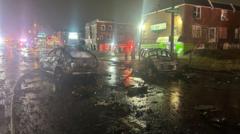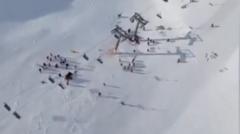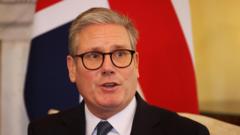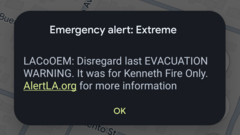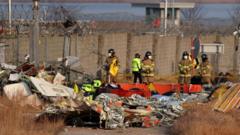Following the catastrophic floods that inflicted significant damage in eastern Spain, political leaders are exchanging blame over the national government's disaster response and coordination failures.
Accusations Mount in Spain Following Devastating Floods
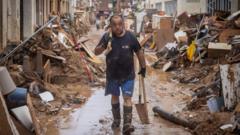
Accusations Mount in Spain Following Devastating Floods
A week on, political tensions rise as leaders question disaster management in Valencia.
As the dust settles from eastern Spain's devastating flash floods, which have claimed at least 218 lives, the once united front among political leaders has fractured into discord and finger-pointing. Initial gestures of cooperation between regional and national figures have quickly devolved into accusations regarding the handling of the disaster's aftermath.
In the wake of the floods, Carlos Mazón, the regional president of Valencia from the conservative People’s Party (PP), had publicly praised Socialist Prime Minister Pedro Sánchez for his support, a rare moment of solidarity in Spain’s typically fractious political landscape. However, Mazón faced intense scrutiny for his slow response to a critical red weather warning issued by Spain's National Meteorological Office (Aemet), delaying communication of the alert to regional citizens by approximately twelve hours before the flooding wreaked havoc.
Alberto Núñez Feijóo, leader of the PP, has openly criticized Aemet and the Sánchez administration, arguing that coordination with the regional government fell short when it was most needed. The fallout for Mazón has been severe, as even within his party, calls for resignation have escalated due to his handling of the situation and previous decisions, including disbanding the Valencia Emergency Unit (UVE).
In a retaliatory stance, Mazón accused the hydrographic agency, the CHJ, of negligence by failing to maintain proper flood alerts, asserting that he could have acted more decisively had the agency reacted differently. The CHJ, however, rebutted his claims, clarifying that it provides data but does not issue alerts directly.
In a significant escalation of personnel, approximately 15,000 military troops, civil protection officers, and police have mobilized for rescue efforts in the Valencia region. Mazón contended that the armed forces were responsible for their deployment protocols, which led to tensions with military leaders who stated that regional requests were essential for resource allocation.
Following calls from Feijóo and others for a national state of emergency, which would shift the crisis management to Madrid and diminish regional authority, political stakes have risen significantly. Simultaneously, onlookers expressed their anger toward the leaders during their recent visit to the severely affected town of Paiporta, accusing them of incompetence.
Despite intense criticism, both Mazón and Sánchez have now proposed substantial aid proposals totalling €42 billion aimed at rebuilding flood-impacted locales; a gesture meant to soothe public outrage and restore confidence in institutional responsiveness.
As the situation evolves, citizens demand resolution rather than blame, longing for collaborative efforts to address the aftermath of this tragedy, emphasizing that they need their leaders to unite in recovery rather than divide in condemnation.
In the wake of the floods, Carlos Mazón, the regional president of Valencia from the conservative People’s Party (PP), had publicly praised Socialist Prime Minister Pedro Sánchez for his support, a rare moment of solidarity in Spain’s typically fractious political landscape. However, Mazón faced intense scrutiny for his slow response to a critical red weather warning issued by Spain's National Meteorological Office (Aemet), delaying communication of the alert to regional citizens by approximately twelve hours before the flooding wreaked havoc.
Alberto Núñez Feijóo, leader of the PP, has openly criticized Aemet and the Sánchez administration, arguing that coordination with the regional government fell short when it was most needed. The fallout for Mazón has been severe, as even within his party, calls for resignation have escalated due to his handling of the situation and previous decisions, including disbanding the Valencia Emergency Unit (UVE).
In a retaliatory stance, Mazón accused the hydrographic agency, the CHJ, of negligence by failing to maintain proper flood alerts, asserting that he could have acted more decisively had the agency reacted differently. The CHJ, however, rebutted his claims, clarifying that it provides data but does not issue alerts directly.
In a significant escalation of personnel, approximately 15,000 military troops, civil protection officers, and police have mobilized for rescue efforts in the Valencia region. Mazón contended that the armed forces were responsible for their deployment protocols, which led to tensions with military leaders who stated that regional requests were essential for resource allocation.
Following calls from Feijóo and others for a national state of emergency, which would shift the crisis management to Madrid and diminish regional authority, political stakes have risen significantly. Simultaneously, onlookers expressed their anger toward the leaders during their recent visit to the severely affected town of Paiporta, accusing them of incompetence.
Despite intense criticism, both Mazón and Sánchez have now proposed substantial aid proposals totalling €42 billion aimed at rebuilding flood-impacted locales; a gesture meant to soothe public outrage and restore confidence in institutional responsiveness.
As the situation evolves, citizens demand resolution rather than blame, longing for collaborative efforts to address the aftermath of this tragedy, emphasizing that they need their leaders to unite in recovery rather than divide in condemnation.


